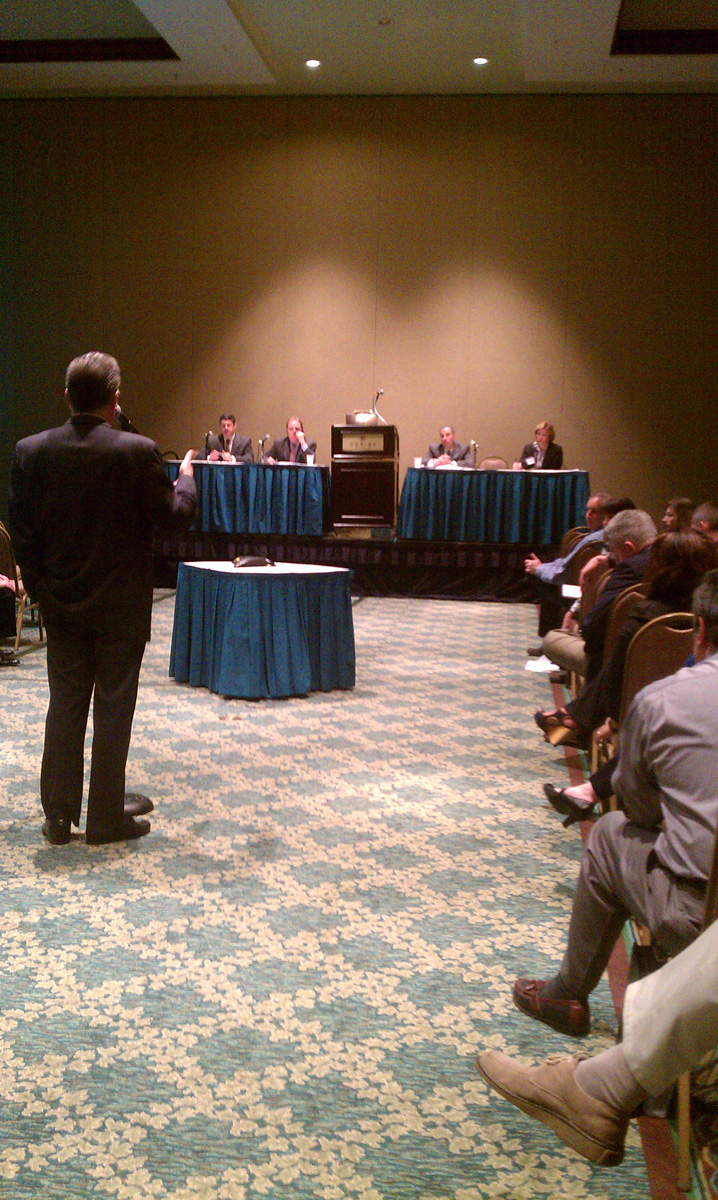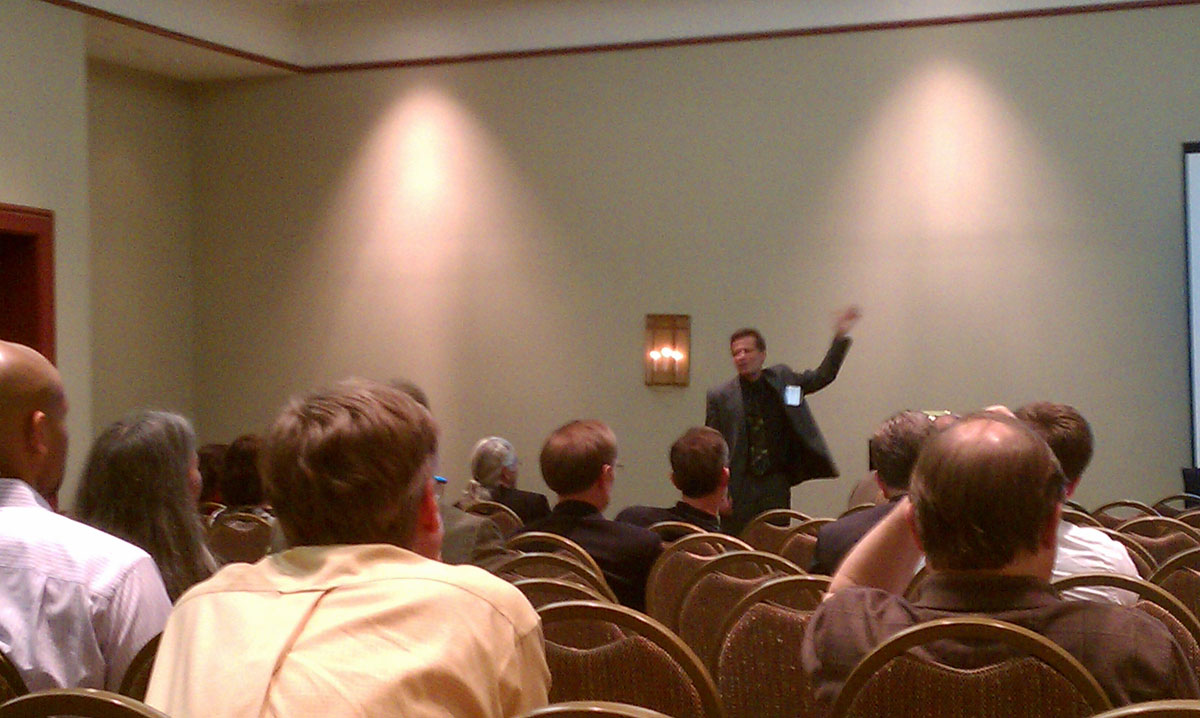
An Expedition 30 crew member aboard the International Space Station took this nighttime photograph of much of the Atlantic coast of the United States. Large metropolitan areas and other easily recognizable sites from the Virginia/Maryland/Washington, D.C. area are visible in the image that spans almost to Rhode Island. Boston is just out of frame at right. Long Island and the New York City area are visible in the lower right quadrant. Philadelphia and Pittsburgh are near the center. Parts of two Russian vehicles parked at the orbital outpost are seen in left foreground. Photo Credit: NASA
February 29, 2012 — Vol. 5, Issue 2
The Academy hosted the third annual international forum at PM Challenge.

An Expedition 30 crew member aboard the International Space Station took this nighttime photograph of much of the Atlantic coast of the United States. Large metropolitan areas and other easily recognizable sites from the Virginia/Maryland/Washington, D.C. area are visible in the image that spans almost to Rhode Island. Boston is just out of frame at right. Long Island and the New York City area are visible in the lower right quadrant. Philadelphia and Pittsburgh are near the center. Parts of two Russian vehicles parked at the orbital outpost are seen in left foreground.
Photo Credit: NASA
The sessions over two days featured panelists from several space agencies, industry partners, and professional organizations. Sessions included the following topics and participants:
International Collaboration in Space: Challenges, Opportunities, and the Way Forward
This session opened the international track, establishing the context for the discussions that will follow, and provide a brief overview of its content.
Participants:
Ed Hoffman, NASA
Mark Langley, Project Management Institute (PMI)
Chris Scolese, NASA (virtual)
An International Collaboration in Technical Workforce Development
Established in 2010 following the inaugural international forum at PM Challenge, the International Project Management Committee (IPMC) provides a forum to exchange best practices in international project management and workforce development to foster improved international program execution. This panel discussion provided the perspectives of five of IPMC’s eighteen member organizations.
Participants:
Ed Hoffman, NASA
Frank Danesy, European Space Agency (ESA)
Toshihiko Oida, Japanese Aerospace Exploration Agency (JAXA)
Ruediger Seuss, German Aerospace Center (DLR)
Lionel Baize, Centre National dEtudes Spatiales (CNES)
Learning from the SSP/ISS International Experience
With the conclusion of the Space Shuttle Program, this session reflected on lessons from early international collaboration on the Shuttle, and how these efforts helped pave the way for collaboration in the development of the International Space Station.
Participants:
John Olson, NASA
Mark Uhran, NASA (virtual)
Joern Rittweger, DLR
William Mackey, Canadian Space Agency (CSA)
Alpha Magnetic Spectrometer: A Space Particle Physics Experiment on ISS
Following in the tradition of the collaboration between the human space flight and space sciences communities on Hubble, the Alpha Magnetic Spectrometer (AMS) represents an example of both international and programmatic collaboration to answer compelling questions about the scale and possible future of the universe.
Participants:
Peggy Evanich, University of Florida
Trent Martin, NASA
Evolving Challenges and Trends in International Project Management
As international collaboration in space has become the new norm for space flight projects, global trends and challenges are reshaping project management. This session will examine some of these key trends and challenges.
Participants:
Ralph Zingle, PMI
Ed Hoffman, NASA
Craig Killough, PMI
Earth Systems Sciences: Global Challenges Requiring Global Collaboration
Space systems play a crucial role in helping us understand Earth’s changing climate. This session—featuring presentations by NASA and ESA Earth Sciences program experts—considered the project management challenges associated with collecting, archiving, and making effective use of space data to improve our understanding of the changing global environment.
Participants:
Steve Volz, NASA (virtual)
Mark Doherty, ESA/European Space Research Institute
A Global Exploration Strategy (ISECG)—Partners, Anticipating the Future…
Representatives from NASA and several other space agencies participating in the International Space Exploration Coordination Group (ISECG) discussed some of the opportunities and challenges associated with forging partnerships for the long-term human exploration of space.
Participants:
John Olson, NASA
Eric Laliberte, CSA
Joon-min Choi, Korea Aerospace Research Institute (KARI)
Bernhard Hufenbach, ESA (virtual)
Gib Kirkham, NASA (virtual)
International Perspectives in Exploration and Implementation
One of the benefits resulting from the IPMC is the opportunity to exchange ideas with partner space agencies on a broad range of topics. This session provided an opportunity to learn from CNES’s foundational work in exploring fundamental questions about human exploration, and to also hear the top paper presented at DLR’s special “Project Management Days Conference” in June 2011, which was developed after its participation in PM Challenge.
Participants:
Lionel Baize, CNES
Petra Georgi, DLR
Jacques Arnould, CNES
Forian David, DLR
Managing Space Projects in a Changing Global Environment
The increasing importance of international collaboration creates new opportunities and challenges for managers of international space flight projects. This session explored changes from the perspective of partners in Korea, Canada, Argentina, and Australia.
Participants:
Joon-min Choi, KARI
Eric Laliberte, CSA
Erio Schweickardt, INVAP (Argentina)
Chris Stevens, PMI-Sydney Australia
Space systems play a crucial role in helping us understand Earth’s changing climate. This session—featuring presentations by NASA and ESA Earth Sciences program experts—considered the project management challenges associated with collecting, archiving, and making effective use of space data to improve our understanding of the changing global environment.







